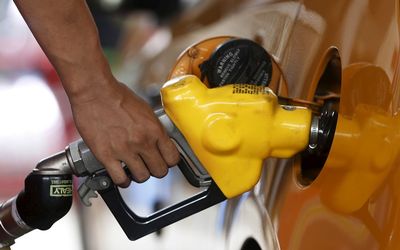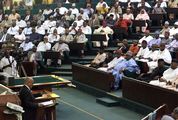IN THIS modern era of low emissions, electric cars, plug-in hybrids and gas powered buses, is it possible that the regular motor car as we know it has become sinful?
It would appear that this could be how Finance Minister Pravin Gordhan sees it. The 30c/litre increase in the fuel levy in Gordhan’s 2016 budget has little relevance to the actual issues surrounding motoring and transport in SA at the moment.
Apart from the additional fuel levy for the Road Accident Fund, the rest goes into the general fiscus with no ring-fencing of the cash for improving roads, road safety or creating cleaner fuels.
Is it a sin tax, like that on tobacco, alcohol and, this year, sugar-laden drinks? Is the motorist being penalised yet again for having to use a private vehicle to get to work? If this is the case then the subject of a lack of alternatives again comes up. The most likely reason, though, is that the motorist is again being used as a cash cow in order to raise additional revenue for the government to spend elsewhere.
This is not to say that some of the money will not go to roads; obviously, the budget for that has to come out of the general fiscus too. However, it is time that some ring-fencing occurred.
Cleaner fuels, road safety and better roads are urgent issues which need addressing and the fuel levy could be utilised in this regard.
It is also interesting how Sanral continues to refute the idea that a fuel levy could pay for the Gauteng e-roads, but the finance minister can just increase the fuel levy without accounting for exactly where this additional revenue will go.
Then there is the so-called tyre tax at R2.50 per kilogramme. This still has to be worked out, with industry representatives unsure of the strategy. Questions have been raised over the way the national tyre recycling organisation, Redisa, conducts its business. In spite of this, it looks as though they will be receiving more money.
The fuel levy is an easy way to raise money and, unlike e-tolls, it is unlikely anyone is going to protest it. But it would be nice to know where it goes and what direct benefit it returns to the motorist.

A worker at state-owned Pertamina, the country's main retailer of subsidised fuel, fills a vehicle at a petrol station in Jakarta. Picture: REUTERS
IN THIS modern era of low emissions, electric cars, plug-in hybrids and gas powered buses, is it possible that the regular motor car as we know it has become sinful?
It would appear that this could be how Finance Minister Pravin Gordhan sees it. The 30c/litre increase in the fuel levy in Gordhan’s 2016 budget has little relevance to the actual issues surrounding motoring and transport in SA at the moment.
Apart from the additional fuel levy for the Road Accident Fund, the rest goes into the general fiscus with no ring-fencing of the cash for improving roads, road safety or creating cleaner fuels.
Is it a sin tax, like that on tobacco, alcohol and, this year, sugar-laden drinks? Is the motorist being penalised yet again for having to use a private vehicle to get to work? If this is the case then the subject of a lack of alternatives again comes up. The most likely reason, though, is that the motorist is again being used as a cash cow in order to raise additional revenue for the government to spend elsewhere.
This is not to say that some of the money will not go to roads; obviously, the budget for that has to come out of the general fiscus too. However, it is time that some ring-fencing occurred.
Cleaner fuels, road safety and better roads are urgent issues which need addressing and the fuel levy could be utilised in this regard.
It is also interesting how Sanral continues to refute the idea that a fuel levy could pay for the Gauteng e-roads, but the finance minister can just increase the fuel levy without accounting for exactly where this additional revenue will go.
Then there is the so-called tyre tax at R2.50 per kilogramme. This still has to be worked out, with industry representatives unsure of the strategy. Questions have been raised over the way the national tyre recycling organisation, Redisa, conducts its business. In spite of this, it looks as though they will be receiving more money.
The fuel levy is an easy way to raise money and, unlike e-tolls, it is unlikely anyone is going to protest it. But it would be nice to know where it goes and what direct benefit it returns to the motorist.





















Change: 0.10%
Change: -0.15%
Change: -0.96%
Change: 0.22%
Change: 0.17%
Data supplied by Profile Data
Change: -1.78%
Change: -0.03%
Change: 0.10%
Change: 0.00%
Change: 0.02%
Data supplied by Profile Data
Change: -0.27%
Change: -0.29%
Change: -0.18%
Change: -0.22%
Change: 0.00%
Data supplied by Profile Data
Change: 0.40%
Change: 0.61%
Change: 0.39%
Change: 0.18%
Change: 0.37%
Data supplied by Profile Data